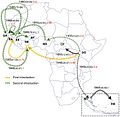Zika virus
Zika virus (ZIKV) is a member of the virus family Flaviviridae and the genus Flavivirus, transmitted primarily by Aedes mosquitoes, particularly Aedes aegypti. First identified in Uganda in the Zika Forest in 1947, Zika virus is related to dengue fever, yellow fever, Japanese encephalitis, and West Nile virus. While it is mainly spread through mosquitoes, Zika virus can also be transmitted through sexual contact, from pregnant women to their fetuses, and through blood transfusion.
Symptoms and Treatment[edit]
Most people infected with Zika virus do not develop symptoms. When symptoms do occur, they are generally mild and include fever, rash, conjunctivitis, muscle and joint pain, malaise, and headache. Symptoms typically last for 2-7 days. Currently, there is no specific treatment for Zika virus infection, and care is generally supportive, focusing on relieving symptoms. Patients are often advised to get plenty of rest, drink fluids to prevent dehydration, and take medicine such as acetaminophen to relieve fever and pain.
Transmission[edit]
Zika virus is primarily transmitted through the bite of an infected Aedes species mosquito, which bites during the day. These mosquitoes can also transmit dengue, chikungunya, and yellow fever viruses. Zika can also be transmitted from a pregnant woman to her fetus during pregnancy, leading to certain birth defects such as microcephaly. Sexual transmission of Zika virus is also possible, and it is recommended to use protection or abstain from sex if there is a risk of Zika virus infection.
Prevention[edit]
Prevention and control rely on reducing mosquitoes through source reduction (removal and modification of breeding sites) and reducing contact between mosquitoes and people. This is achieved by using insect repellent, wearing clothes (preferably light-colored) that cover as much of the body as possible, using physical barriers such as screens, closed doors, and windows, and sleeping under mosquito nets. It is also important for people traveling to areas where Zika is present to take the necessary precautions to protect themselves from mosquito bites.
Epidemiology[edit]
Since its discovery, Zika virus has been reported in tropical Africa, Southeast Asia, the Pacific Islands, and the Americas. The largest outbreak of Zika virus disease in history occurred from 2015 to 2016 in the Americas, leading to widespread concern due to the virus's possible association with microcephaly and Guillain-Barré syndrome. The World Health Organization declared the end of the Zika virus emergency in November 2016, but it remains a significant public health challenge in many areas.
Research[edit]
Research on Zika virus has intensified since the 2015-2016 outbreak, focusing on understanding the virus's pathology, developing vaccines, and finding effective treatments. Several vaccine candidates are in various stages of development, but as of now, no vaccine is available for public use.
-
Electron micrograph of Zika virus
-
Colored model of Zika virus structure
-
Zika virus under microscope
-
Global distribution of Aedes aegypti
-
Zika virus rash on arm
-
CDC map of Zika virus distribution as of January 2016
-
Phylogenetic analysis map of Zika virus
-
Molecular evolution of Zika virus
-
Microcephaly associated with Zika virus
Ad. Transform your life with W8MD's Budget GLP-1 injections from $75


W8MD offers a medical weight loss program to lose weight in Philadelphia. Our physician-supervised medical weight loss provides:
- Weight loss injections in NYC (generic and brand names):
- Zepbound / Mounjaro, Wegovy / Ozempic, Saxenda
- Most insurances accepted or discounted self-pay rates. We will obtain insurance prior authorizations if needed.
- Generic GLP1 weight loss injections from $75 for the starting dose.
- Also offer prescription weight loss medications including Phentermine, Qsymia, Diethylpropion, Contrave etc.
NYC weight loss doctor appointmentsNYC weight loss doctor appointments
Start your NYC weight loss journey today at our NYC medical weight loss and Philadelphia medical weight loss clinics.
- Call 718-946-5500 to lose weight in NYC or for medical weight loss in Philadelphia 215-676-2334.
- Tags:NYC medical weight loss, Philadelphia lose weight Zepbound NYC, Budget GLP1 weight loss injections, Wegovy Philadelphia, Wegovy NYC, Philadelphia medical weight loss, Brookly weight loss and Wegovy NYC
|
WikiMD's Wellness Encyclopedia |
| Let Food Be Thy Medicine Medicine Thy Food - Hippocrates |
Medical Disclaimer: WikiMD is not a substitute for professional medical advice. The information on WikiMD is provided as an information resource only, may be incorrect, outdated or misleading, and is not to be used or relied on for any diagnostic or treatment purposes. Please consult your health care provider before making any healthcare decisions or for guidance about a specific medical condition. WikiMD expressly disclaims responsibility, and shall have no liability, for any damages, loss, injury, or liability whatsoever suffered as a result of your reliance on the information contained in this site. By visiting this site you agree to the foregoing terms and conditions, which may from time to time be changed or supplemented by WikiMD. If you do not agree to the foregoing terms and conditions, you should not enter or use this site. See full disclaimer.
Credits:Most images are courtesy of Wikimedia commons, and templates, categories Wikipedia, licensed under CC BY SA or similar.
Translate this page: - East Asian
中文,
日本,
한국어,
South Asian
हिन्दी,
தமிழ்,
తెలుగు,
Urdu,
ಕನ್ನಡ,
Southeast Asian
Indonesian,
Vietnamese,
Thai,
မြန်မာဘာသာ,
বাংলা
European
español,
Deutsch,
français,
Greek,
português do Brasil,
polski,
română,
русский,
Nederlands,
norsk,
svenska,
suomi,
Italian
Middle Eastern & African
عربى,
Turkish,
Persian,
Hebrew,
Afrikaans,
isiZulu,
Kiswahili,
Other
Bulgarian,
Hungarian,
Czech,
Swedish,
മലയാളം,
मराठी,
ਪੰਜਾਬੀ,
ગુજરાતી,
Portuguese,
Ukrainian








